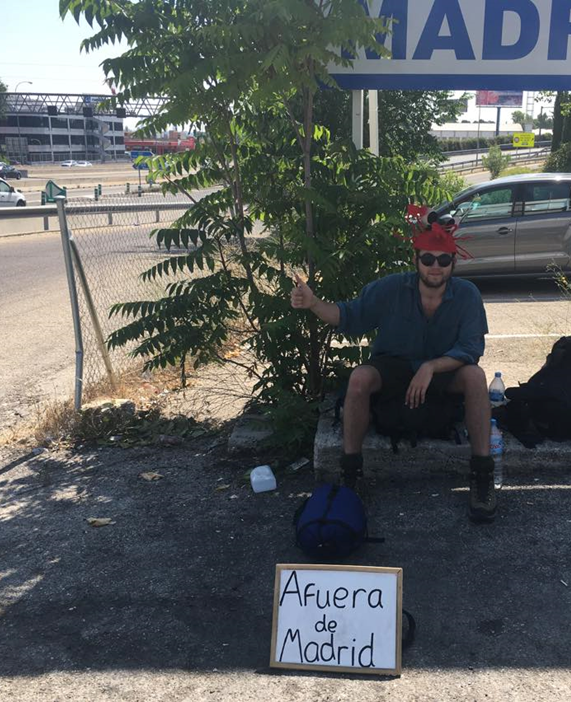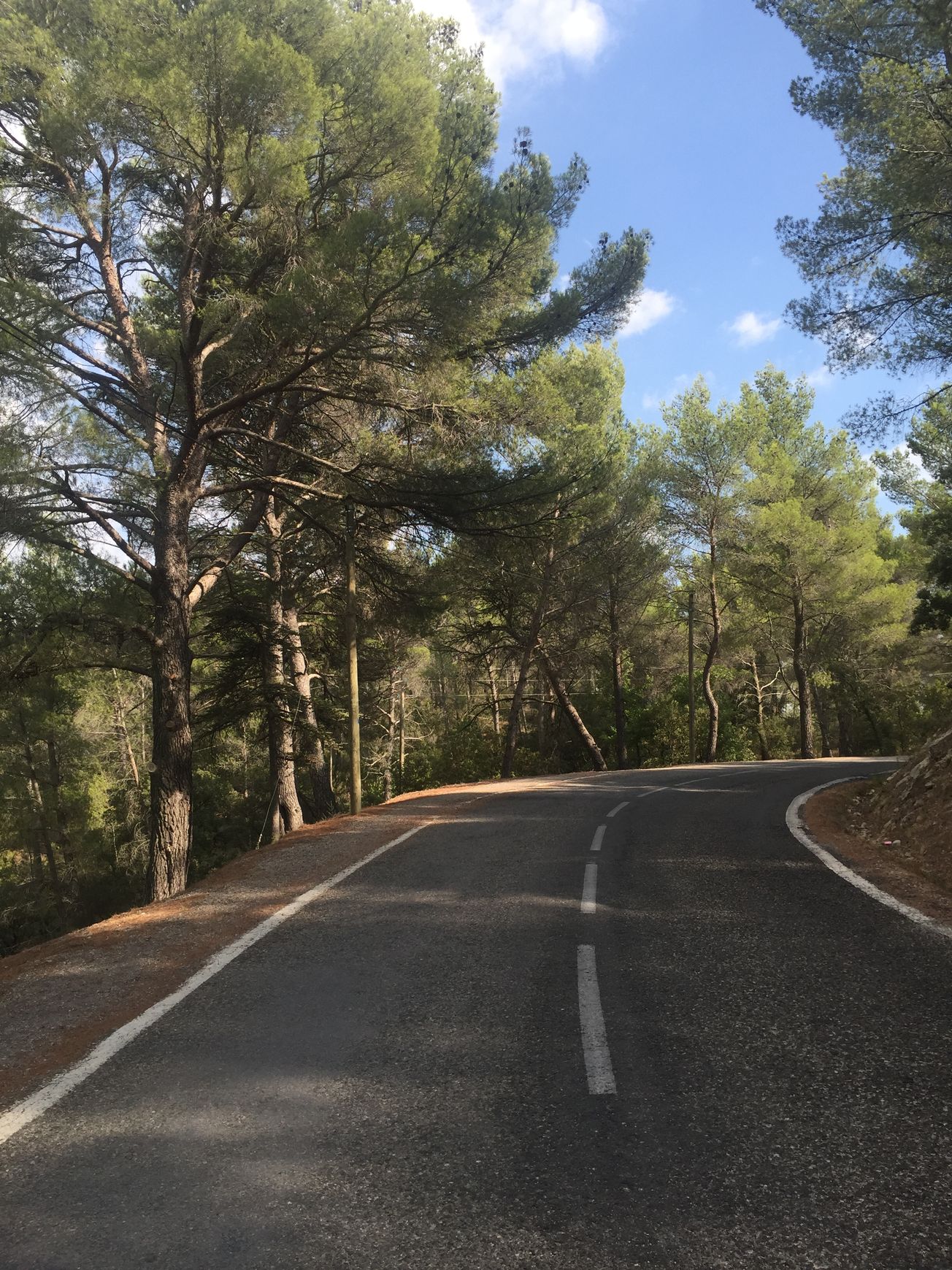By Hugh Richards, Fourth year Biology
The Croft Magazine//It was late on a weekday when Hugh received the call from my friend Elliot. ‘Fancy hitchhiking to Morocco this summer?’ It sounded like a challenge and he hadn’t sorted out any holiday plans yet. So why not?
We set off from Plymouth, taking the overnight ferry to Roscoff on the North coast of France. We landed at 6am; after a quick breakfast we found a spot on the road leading out of town. Four days and twelve lifts later and we were sipping beers in San Sebastián, Spain. A further four rides took us to Madrid, though this threw up a whole host of its own problems (see below). We eventually made it to Morocco, learning a few tips for hitchhiking along the way.
DO bring a whiteboard
An essential for hitchhiking is some method for conveying where you want to go. This can be as specific as Angoulême or as vague as ‘South’, though a trade-off exists between the two: go specific and find the perfect lift, or go vague and get one faster. Furthermore, and especially for long-distance journeys, the location on your sign will have to change frequently, often many times per day. A whiteboard, therefore, as opposed to the classic marker-pen-and-cardboard combo, is a great help.
DO NOT go to Madrid or any other large city for that matter
As mentioned above, Madrid was our downfall. Cities in general seem to be analogous to black holes in a hitchhiking context, their ring-roads representing the event horizon. As soon as you touch one, you are past the point of no return and inevitably sucked into the urban jungle.
This is far from ideal. Cities, with fewer people travelling long-distance and poorer places to hitch from, are the bane of a hitchhiking journey. In our case, we spent 3 days sleeping in hammocks at petrol stations before having to descend into the inner city. From there, a series of demoralising failures to escape Madrid brought an end to our attempts. Try to avoid situations such as this at all costs.

DO bring sufficient camping essentials
Thinking about how and where you will sleep is very important. Even assuming that you intend to book accommodation at some point, there will definitely be nights where darkness falls, and you are not in a position to sleep indoors (one night on our trip resulted in a night spent on the middle of a roundabout).
A tent would suffice, but I recommend taking a hammock. They are much lighter, and afford you greater flexibility in where you can pitch. They are of course largely dependent on trees, although this too is flexible (for example, we used a tree and the railing of a train track fence one night). Also important is a source of warm food; a Trangia or similar portable cooker is advisable.
DO NOT get drunk before you pitch camp
As well as packing the essentials, it is also important to be wary of where you sleep. Upon arriving in Spain, Elliot and I became so excited that we proceeded to the nearest tapas bar and drank as much cerveza as possible before the establishment closed. Tottering through San Sebastián, looking for somewhere to pitch a hammock, we stumbled across a small cluster of trees. Sloppily we set up camp and fell into a booze-addled slumber.
I was awoken at 7am by a police officer tapping the strings of my hammock with his baton. It transpired to be much more of a town square than just a group of trees; we were told to pack up and move along as fast as possible. Fortunately, Elliot - as a very capable Spanish speaker - managed to lighten the mood somewhat between us and the officers. Nonetheless, it was an unpleasant way to be awoken, hungover.
The moral: arrange your sleeping arrangements before you celebrate the progress of your trip.
DO learn some of the language
Taking a leaf from Elliot’s book is especially useful for two reasons. Firstly, being able to write directions on your whiteboard in the native language (e.g. ‘Sud’ for South) is of course helpful. Secondly, and more importantly, is being able to talk with your driver. Explaining where you’d like to go, asking what their destination is, and so forth, is essential.
Engaging in conversation is a desirable addition. Not only does it make the driver more receptive, and probably more likely to pick up foreign hitchhikers again, it also makes the journey pass a lot faster. Of course, fluency is the optimum, but looking up some conversational basics goes a long way too.
DO NOT look like a murderer
Making yourself look presentable, friendly, and non-threatening will go a long way in finding yourself a lift. Through media sensationalism, some people are afraid of picking up hitchers. Negating this fear is key. I will illustrate this point by means of example.
We had been waiting at a French service station for hours; I was playing harmonica (shockingly) while Elliot slept. A woman who’d passed us on her way into the shop came back out, and asked if we wanted a lift. Elated, we jumped to our feet. “I wasn’t sure if I should pick you up”, she said, “but then I thought: ‘How many murderers play harmonica?’”. In short: try to convey that you are normal people, and not fugitives on the run.
DO familiarise yourself with the local hitchhiking laws and culture
The law and culture around hitchhiking varies greatly across Europe, and presumably across the globe. France is very good for it: as stated we travelled border-to-border in 4 days. Spain however is not so good. People seemed less keen on giving lifts, and there were frequent claims of it actually being illegal. Though this is not the case, if the majority of the public thinks so, it is harder to get a lift. So, research the national and local laws regarding hitchhiking as well as checking internet forums for guidance on hitching through specific countries.
If you follow these words of advice, you’re probably off to a good start. But don’t forget to do your own research and find specific tips for the route you plan to take before you start.
Featured Image: Epigram/Lily Donnelly
Find The Croft Magazine in every copy of Epigram newspaper!









